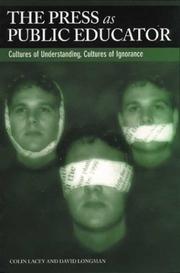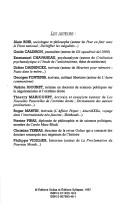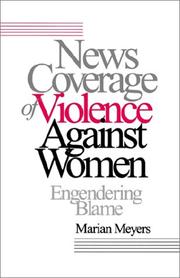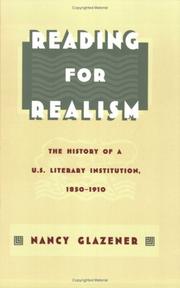| Listing 1 - 10 of 15 | << page >> |
Sort by
|
Dissertation
Abstract | Keywords | Export | Availability | Bookmark
 Loading...
Loading...Choose an application
- Reference Manager
- EndNote
- RefWorks (Direct export to RefWorks)
Dissertation
Abstract | Keywords | Export | Availability | Bookmark
 Loading...
Loading...Choose an application
- Reference Manager
- EndNote
- RefWorks (Direct export to RefWorks)
Monarchie --- Dans la presse. --- Albert
Book
ISBN: 9782841135189 2841135187 Year: 1997 Volume: 74 Publisher: Toulouse: Milan,
Abstract | Keywords | Export | Availability | Bookmark
 Loading...
Loading...Choose an application
- Reference Manager
- EndNote
- RefWorks (Direct export to RefWorks)
Freedom of the press --- Liberté de la presse --- Liberté de la presse
Book
ISBN: 3452239632 9783452239631 Year: 1997 Volume: 45 45 Publisher: Köln: Heymann,
Abstract | Keywords | Export | Availability | Bookmark
 Loading...
Loading...Choose an application
- Reference Manager
- EndNote
- RefWorks (Direct export to RefWorks)
Book
Year: 1997 Publisher: Genève, Suisse : Service de liaison non gouvernemental des Nations Unies (SLNG),
Abstract | Keywords | Export | Availability | Bookmark
 Loading...
Loading...Choose an application
- Reference Manager
- EndNote
- RefWorks (Direct export to RefWorks)
Freedom of the press --- Freedom of the press. --- Liberté de la presse
Book
ISBN: 2707128295 Year: 1997 Publisher: Paris : La Découverte,
Abstract | Keywords | Export | Availability | Bookmark
 Loading...
Loading...Choose an application
- Reference Manager
- EndNote
- RefWorks (Direct export to RefWorks)
Freedom of the press --- Human rights --- Terrorism --- Liberté de la presse --- Droits de l'homme (Droit international) --- Terrorisme --- Algeria --- Algérie --- Politics and government --- Politique et gouvernement --- Liberté de la presse --- Algérie --- Droits de l'homme --- Violence politique

ISBN: 1860205364 9781860205361 Year: 1997 Publisher: Luton: University of Luton. John Libbey Media,
Abstract | Keywords | Export | Availability | Bookmark
 Loading...
Loading...Choose an application
- Reference Manager
- EndNote
- RefWorks (Direct export to RefWorks)
Presse --- Journaux --- Environnement --- Medias --- Influence. --- Aspect social --- Lecture --- Protection, dans la presse --- Influence --- Presse - Grande-Bretagne - Influence. --- Presse - Aspect social - Grande-Bretagne --- Journaux - Lecture - Aspect social - Grande-Bretagne. --- Environnement - Protection, dans la presse - Grande-Bretagne --- Medias - Etats-Unis - Influence

ISBN: 2911453182 2907993461 9782911453182 9782907993463 Year: 1997 Publisher: Villeurbanne: Golias,
Abstract | Keywords | Export | Availability | Bookmark
 Loading...
Loading...Choose an application
- Reference Manager
- EndNote
- RefWorks (Direct export to RefWorks)
Holocaust denial --- Révisionnisme (Holocauste, 1939-1945) --- Révisionnisme (Holocauste, 1939-1945) --- Holocaust denial - France --- Presse d'extrême droite --- Antisémitisme --- Extrême droite --- Négationnisme --- France --- 1970-2000 --- Dans la presse

ISBN: 0803956363 Year: 1997 Publisher: Thousand Oaks London New Delhi SAGE
Abstract | Keywords | Export | Availability | Bookmark
 Loading...
Loading...Choose an application
- Reference Manager
- EndNote
- RefWorks (Direct export to RefWorks)
Crime and the press --- Crime et la presse --- Femmes dans la presse --- Misdaad en de pers --- Vrouwen in de pers --- Women in the press --- Crime and the press. --- Women --- Crimes against. --- Press coverage. --- Social problems --- Mass communications --- United States --- Crimes against --- United States of America --- Violence --- Media --- Book

ISBN: 0822318709 0822318806 0822399938 Year: 1997 Volume: *6 Publisher: Durham (N.C.) : Duke university press,
Abstract | Keywords | Export | Availability | Bookmark
 Loading...
Loading...Choose an application
- Reference Manager
- EndNote
- RefWorks (Direct export to RefWorks)
Reading for Realism presents a new approach to U.S. literary history that is based on the analysis of dominant reading practices rather than on the production of texts. Nancy Glazener's focus is the realist novel, the most influential literary form of the nineteenth and twentieth centuries - a form she contends was only made possible by changes in the expectations of readers about pleasure and literary value. By tracing readers' collaborations in the production of literary forms, Reading for Realism turns nineteenth-century controversies about the realist, romance, and sentimental novels into episodes in the history of readership. It also shows how works of fiction by Rebecca Harding Davis, Henry James, Nathaniel Hawthorne, and others participated in the debates about literary classification and reading that, in turn, created and shaped their audiences. Combining reception theory with a materialist analysis of the social formations in which realist reading practices circulated, Glazener's study reveals the elitist underpinnings of literary realism. At the book's center is the Atlantic group of magazines, whose influence was part of the cultural machinery of the Northeastern urban bourgeoisie and crucial to the development of literary realism in America. Glazener shows how the promotion of realism by this group of publications also meant a consolidation of privilege - primarily in terms of class, gender, race, and region - for the audience it served. Thus American realism, so often portrayed as a quintessentially populist form, actually served to enforce existing structures of class and power.
Realism in de pers --- Realism in the press --- Réalisme dans la presse --- American periodicals --- Literature and society --- Realism in the press. --- History --- 19th century --- United States --- Journalism --- Sociology of literature --- anno 1800-1899 --- Press --- Periodicals --- United States of America
| Listing 1 - 10 of 15 | << page >> |
Sort by
|

 Search
Search Feedback
Feedback About UniCat
About UniCat  Help
Help News
News